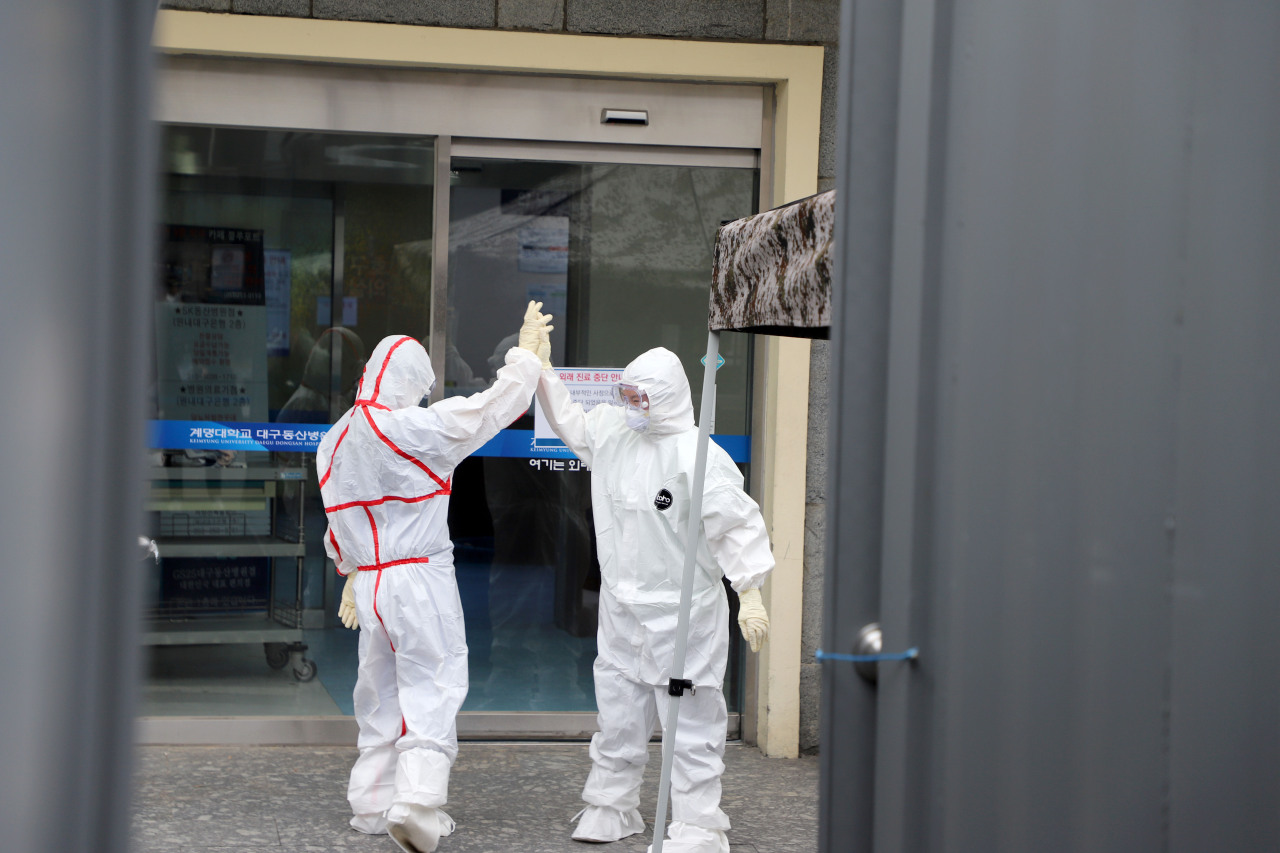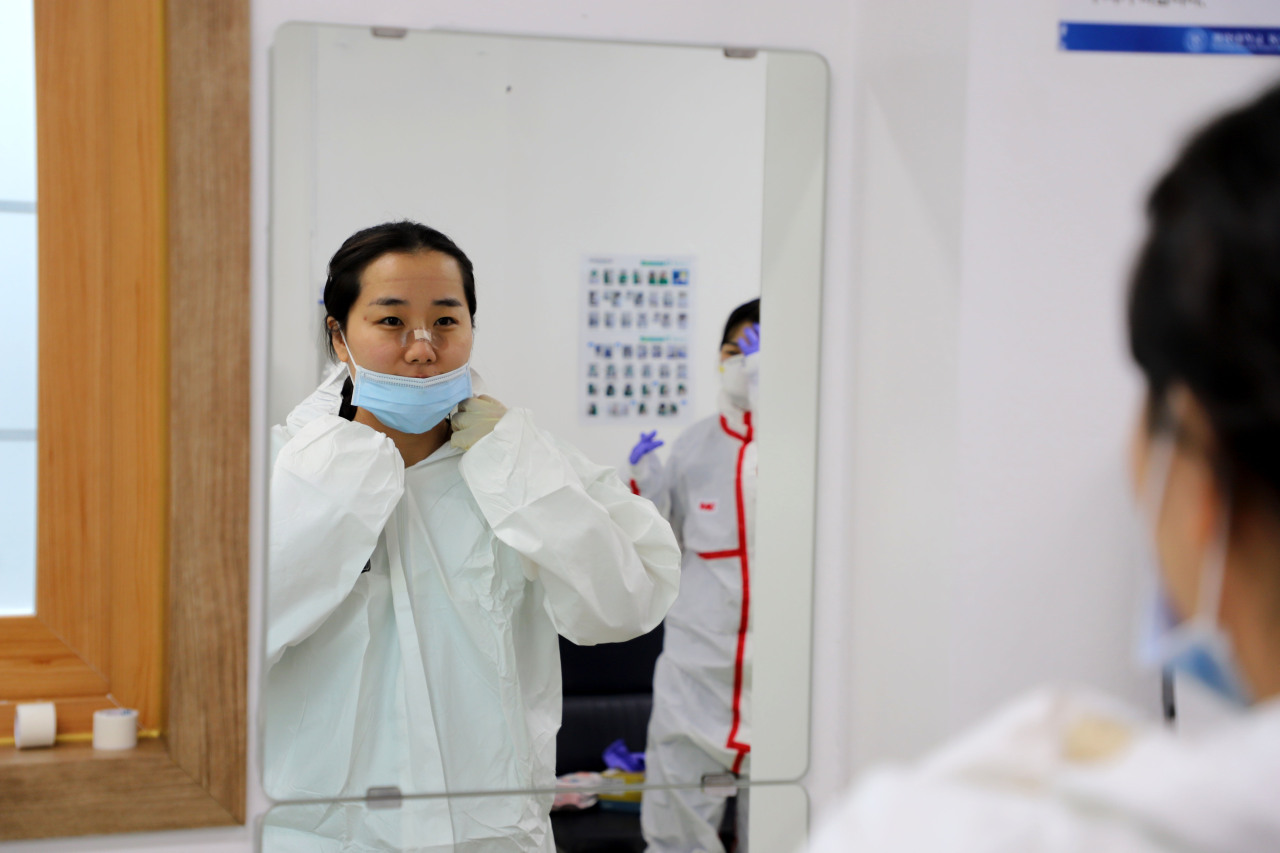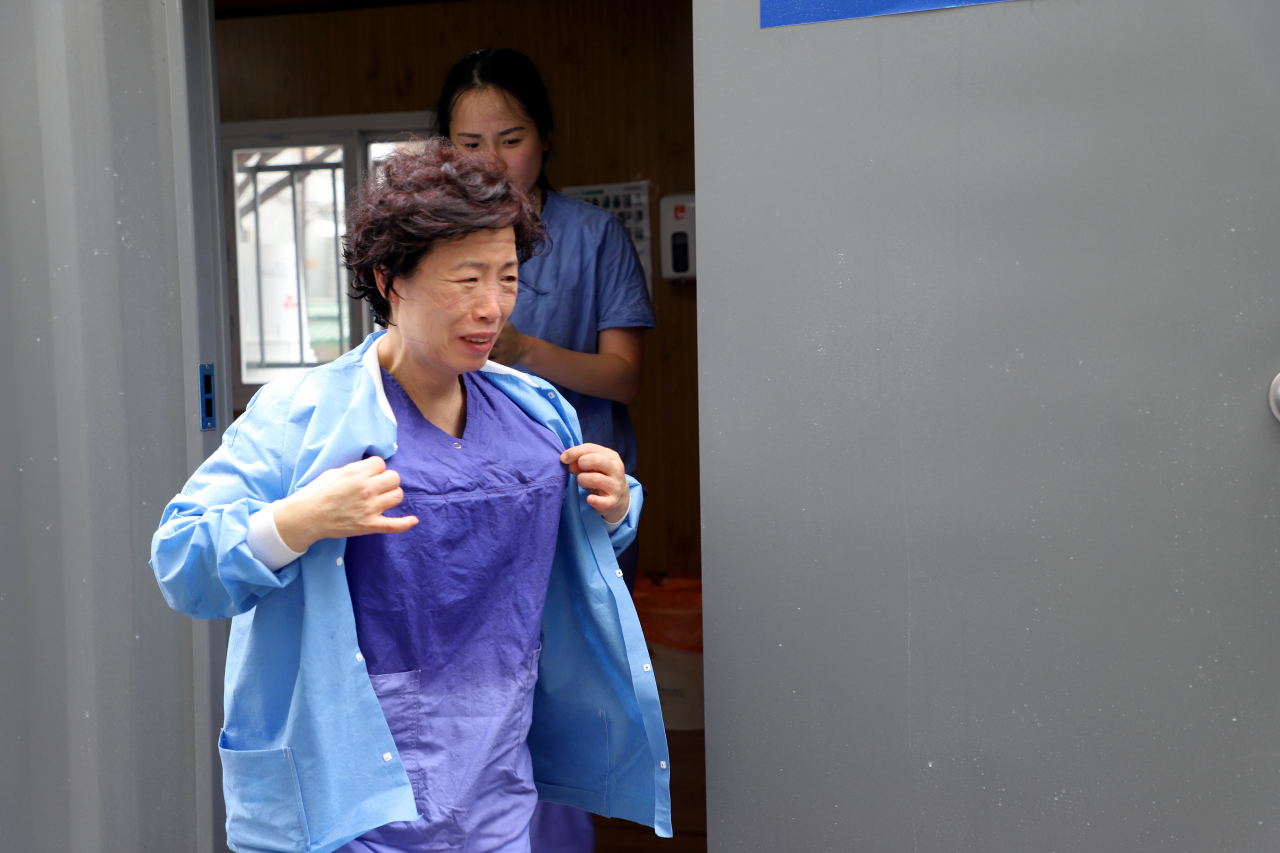‘Hardest part is not knowing when this will end’
Lengthy battle exhausts doctors, nurses on front line of coronavirus fight
By Kim ArinPublished : March 30, 2020 - 18:29

Health care workers on the front line of the novel coronavirus fight are working grueling shifts and exhausted -- risking infections every day at work since the first case was found in South Korea on Jan. 20.
As the outbreak prolongs, the burnout of COVID-19 warriors is a real threat in the quest to quell the virus, experts worry.
The decline in the daily tally belies the mounting workload for those on the front line, says Choi Youn-suk, a head nurse at the coronavirus-only Keimyung Dongsan Hospital in Daegu.
Although the virus curve may have been flattened, the accumulating number of patients is still high with many of those infected experiencing worsening symptoms that require critical care, Choi told The Korea Herald over the weekend.
“At our hospital, 110 to 120 nurses -- including emergency help from volunteers -- are looking after over 390 virus patients,” she said.
Nurses have tight shifts, but there are physical limitations on how long the protective gear can be kept on, she said. And taking a break for the bathroom or a snack is practically impossible once the full gear is on.
“Two hours is about the maximum you can last under the layers. So we limit each shift to two hours, working eight hours a day in total.”
Choi said the hospital needed more nurses to meet the demand for care -- experienced nurses, in particular, who are capable of coping with patients undergoing intubation and ventilation at intensive care units.
Retaining nurses in their jobs is just as crucial as recruitment efforts in the virus-related short-staffing.
Nursing is predominantly a female profession, and motherhood has forced some nurses working with virus patients to take leave, according to a Korean Nurses Association official.
“Nurses who are primary caregivers in the family, whether it be for their children or elderly parents, face fears of bringing the disease home to their vulnerable family members,” he said.


Infections of doctors and nurses is an emerging threat that could incapacitate action on the front lines.
The Korea Centers for Disease Control and Prevention said Saturday that 121 health care workers have been confirmed with the virus in Daegu alone. At least two of them were in a critical state.
The centers did not disclose how many of the doctors and nurses contracted the virus in the line of duty. It just said that, including nursing assistants, 34 of them were linked to Shincheonji, a religious sect traceable to over 5,000 infections here. Data for the rest of the country was not available.
Still, the news came as a shock to Daegu Medical Association President Lee Seong-gu, who said over the phone Saturday that they were not aware of the infection tally for doctors and nurses.
Losing doctors and nurses to the illness could exacerbate the short staffing problems, he said.
“Medical personnel as well as hospital workers are increasingly dropping out, especially at smaller institutions,” he said. “Keeping our health care providers safe and healthy has to be a big priority.”
Lee said closing borders on foreign nationals’ enty has to be a consideration at this point, citing the Korean Society of Infectious Diseases chief Peck Kyong-ran’s statement Thursday.
“Medical workers are already worn out as it is. There is hardly extra room to care for more patients coming in, let alone for ones here,” Peck wrote in a Facebook post, arguing in favor of amplified travel restrictions.
“If there is a way we can lessen the possibility of so much as one case entering the country, I say let’s do it,” Lee said, adding that many doctors and nurses working with virus patients shared the sentiment.
“One new patient is too many. Having one less patient on the caseload helps significantly reduce burnout.”
Medical workers being knocked out from exhaustion is not a plight unique to Daegu.
Yongsan Medical Association Vice President Choi Seung-jun said doctors at primary care clinics had been lending a helping hand after work at testing centers in and around the district for about a month now.
“This means doctors are working extra shifts after their offices are closed,” he said. “For the system to be sustainable in the long run, we need to start discussing how to make it less physically daunting for those who are on the job.”
Choi said the virus was terrifying for doctors too.
“My son is on COVID-19 duty as a public health doctor in Cheongsong (in North Gyeongsang Province) alongside five or six colleagues. I’m proud of these young doctors who are showing incredible commitment and doing a wonderful job,” he said. “But sometimes I get calls from him telling me about the stress of working under extreme pressure.”
Asked if he wasn’t worried for his son, Choi replied “No”: “It’s what any doctor would do.”
The hardest part is not knowing how long the outbreak would persist -- not even top researchers leading the country’s virus response.
Infectious diseases specialist Kim Tae Hyong of Soonchunhyang University Hospital, who is on the medical societies’ joint committee for COVID-19 response, said in a phone interview that there was a multitude of factors that rendered a projection of the outbreak’s trajectory difficult.
“Some experts are beginning to say the immunological memory retained after infection may be short term,” he said, discussing cases of recovered patients testing positive again. “In which case patients who survive can catch it again a few months later, and a herd immunity scenario will be unfeasible even if the whole of Korea were to get infected.”
On health worker shortages, Kim said it was “a chronic problem that has existed since before the virus, and was unfortunately left unremedied until a crisis hit.”
Asked what rest of the society could do to share medical workers’ burdens, he said, “Our game plan remains the same: Practicing good hygiene, wearing face masks and social distancing.”
By Kim Arin (arin@heraldcorp.com)







![[KH Explains] How should Korea adjust its trade defenses against Chinese EVs?](http://res.heraldm.com/phpwas/restmb_idxmake.php?idx=644&simg=/content/image/2024/04/15/20240415050562_0.jpg&u=20240415144419)












![[Today’s K-pop] Stray Kids to return soon: report](http://res.heraldm.com/phpwas/restmb_idxmake.php?idx=642&simg=/content/image/2024/04/16/20240416050713_0.jpg&u=)